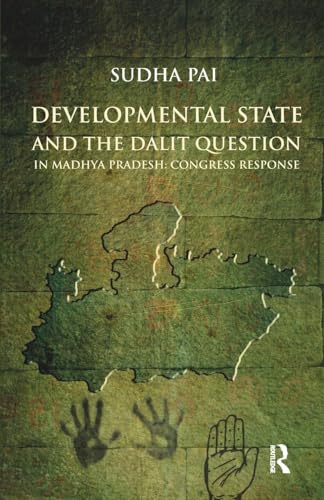Developmental State and the Dalit Question in Madhya Pradesh: Congress Response
Developmental State and the Dalit Question in Madhya Pradesh: Congress Response is backordered and will ship as soon as it is back in stock.
Couldn't load pickup availability
Genuine Products Guarantee
Genuine Products Guarantee
We guarantee 100% genuine products, and if proven otherwise, we will compensate you with 10 times the product's cost.
Delivery and Shipping
Delivery and Shipping
Products are generally ready for dispatch within 1 day and typically reach you in 3 to 5 days.
Book Details
-
Publisher: Routledge
-
Author: Sudha Pai
-
ISBN: 9781138664869
-
Binding: Paperback
-
Pages: 554
-
Release Date: 21-01-2016
-
Languages: English
About The Book
"Dalit Assertion and the Political Response of the Congress in Madhya Pradesh" by Sudha Pai provides an in-depth analysis of the political dynamics surrounding Dalit assertion in the Hindi heartland, particularly in Madhya Pradesh, during the mid-1980s to the early 2000s. This study focuses on the rise of political consciousness among the lower-caste communities, leading to the formation of identity-based parties. It highlights the Congress party’s response to the political assertion of Dalits in Madhya Pradesh under the leadership of Digvijay Singh.
While Bahujan Samaj Party (BSP) and Rashtriya Janata Dal (RJD) in Uttar Pradesh and Bihar embraced a model of political mobilisation to capture Dalit and backward caste votes, the Congress party in Madhya Pradesh took a different route. It adopted a new model of development, exemplified by the historic Bhopal Conference in 2002, where the emphasis was placed on providing economic empowerment to Dalits and tribals rather than simply relying on political mobilisation.
Pai's study critically examines the state-led development model of Dalit upliftment, questioning whether an enlightened political elite can bring about real social change from above. Through empirical fieldwork, the book offers insights into the challenges and limitations of this approach and analyzes the relationship between the state and society. It sheds light on the redistributive paradigm of development and the difficulties in implementing social change without a significant upsurge from below.
Key Features:
-
Focus on Dalit political assertion and its impact on the Hindi heartland, especially in Madhya Pradesh.
-
A study of the Congress party’s response under Digvijay Singh and its shift toward economic upliftment of Dalits and tribals.
-
A critique of the state-led development model and the role of an enlightened political elite in driving social change.
-
Empirical data based on extensive fieldwork.
-
Examination of the limits of state-driven development in addressing the needs of weaker sections of society.
This book is an important read for those interested in the politics of Dalit empowerment, state development models, and caste-based political dynamics in India.





